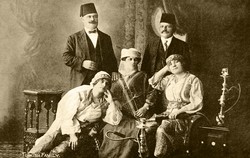Ottoman/Turkish business environments
The Ottoman Empire, centred in modern Turkey, existed in various forms for over 600 years. The Ottomans and modern Turkish people have often had a troubled relationship with Europe, including in economic terms. The EU-funded EVOBUSORG (Evolution of business organizations in the European periphery: Ottoman Empire and Turkish Republic, 1850-1950) project examined the historical evolution of businesses per the project title. The team studied the effects of institutional heritage on choices about forms of legal organisation. Researchers also addressed the challenges latecomers faced in their attempts to adapt foreign legal institutions to the Turkish business environment. In a research-first, the team collected comprehensive and quantifiable historical data on Ottoman and Turkish businesses from various modern Turkish archives. Researchers transcribed Arabic Turkish scripts into modern Turkish. From the data resource, they extracted various key data about registered business organisations, including on the commercial sector and capital size. Key variables used for statistical analysis were business entry rates and survival likelihood. Researchers hence investigated the emergence and evolution of businesses. The study focused on the links between political economy, legal transplantation processes and business activity. The group concluded that the early (1914-1929) rise in incorporation was driven partly by the political authority’s attempts to create a ‘national bourgeoisie’. Bottom-up local efforts to exclude foreigners and non-Muslims from commerce also explain the rise. EVOBUSORG additionally determined that semi-political institutions strongly affected the emergence of incorporated businesses, by helping to establish networks of capital pooling and political patronage. Other findings concern the introduction of a wealth tax intended to undermine non-Muslims, which instead destroyed productive businesses and set the economy back. Major implications of the study were two-fold. Firstly, effective legal reform could not be achieved without understanding of the political economy issues. Secondly, political acts concerning entrenched interests should be analysed in terms of minorities able to support or hinder legal and other reforms. The project revealed new interpretations about previously unexamined aspects of Ottoman business and economic history. The work of EVOBUSORG also contributed to academic debates about the long-term economic backwardness of the Middle East.







